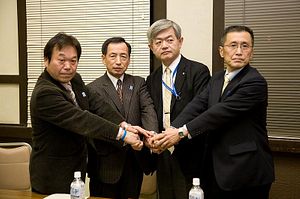As The Diplomat noted on Tuesday, Japan and North Korea held talks this week in Stockholm, which ended on Wednesday. After much speculation as to whether or not the two sides would be able to strike an agreement over a raft of issues (including the North Korean abduction of Japanese citizens, Japanese sanctions, and North Korea’s nuclear and ballistic missile testing), it appears the two sides have reached a tentative agreement concerning the two most easily resolved issues.
On Thursday, Japanese Prime Minister Shinzo Abe said that North Korea had agreed to reopen an investigation into the abduction of Japanese citizens in the 1970s and 80s, according to Reuters. In a separate interview, Chief Cabinet Secretary Yoshihide Suga said that once the probe is reopened, Japan will ease certain sanctions. Depending on the results of the investigation, Japan might also consider providing humanitarian assistance.
North Korea’s official news outlet KCNA stated, “the DPRK (North Korea) side … expressed the willingness to conduct a comprehensive and full-scale survey… when survivors are found, while handling the remains of Japanese, the DPRK side agreed to discuss the issue of course of action… in the direction of sending them back to Japan.”
The U.S. and South Korea were much more reserved in their response to the negotiations outcome. Yonhap News Agency reported a senior South Korean diplomat as saying that while South Korea understands how important the abduction issue is for Japan diplomatically, it must be resolved in concert with efforts to address the nuclear issue. The U.S. State Department’s spokeswoman, Jen Psaki, emphasized transparency. She said “we were alerted that they were planning to engage in those discussions, [and] we continue to support Japanese efforts to resolve the abduction issues in a transparent manner.”
The above Reuters article also stated that, when Suga was asked if Tokyo had taken a position out of step with its allies, he said, “It’s impossible. This agreement covers sanctions that Japan imposed on its own. It is not related to U.N. sanctions.” He also said that Japan would not normalize relations with North Korea until their was a “comprehensive solution” concerning not just its abducted citizens, but also North Korea’s missile and nuclear development programs.
The Japanese and North Koreans have demonstrated that narrowing the scope of negotiations can produce limited, incremental progress. Each side may be using each other in order to service a different agenda; for instance, North Korea may have hoped to cause friction in the U.S.-Japanese-South Korean alliance. However, the resolution of lower-level, bilateral issues provides a framework for continued dialogue, should any of the regional parties concerned find the need and opportunity to do so.

































